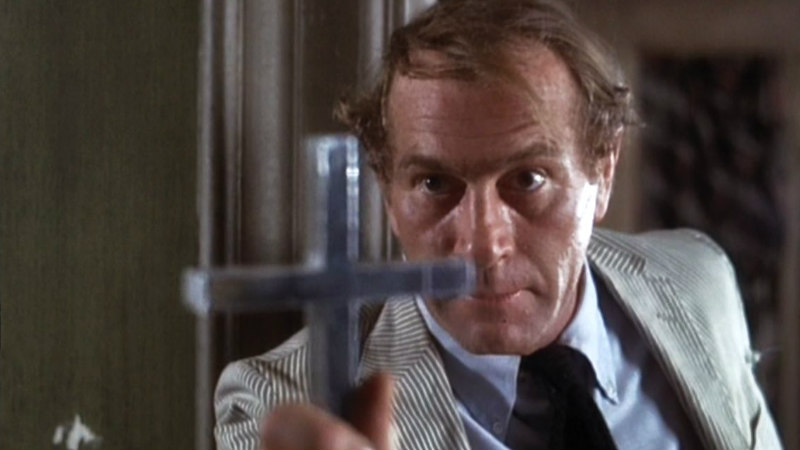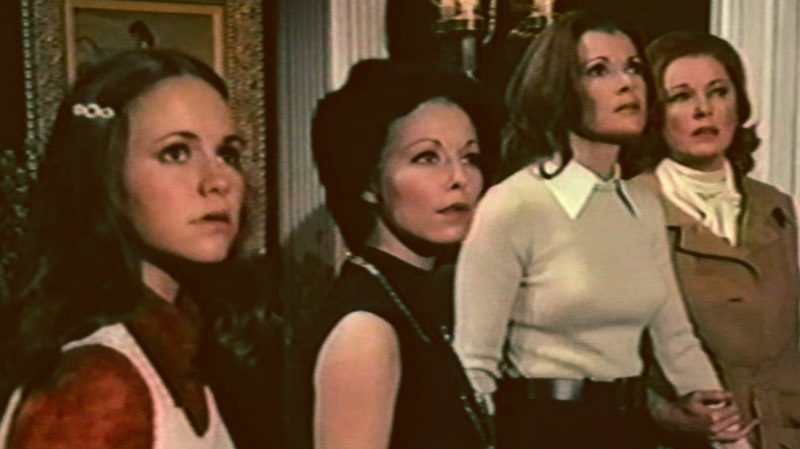
Some thoughts on the passing of director John Llewellyn Moxey.
Words by Eric Hillis

If there's a Mount Rushmore of 1970s TV movie directors, John Llewellyn Moxey is up there with Dan Curtis, John Badham and Steven Spielberg. Moxey, who sadly passed away on April 29th, worked in both cinema and TV, and on both sides of the Atlantic, but it's his work in the realm of the '70s TV movie that he's perhaps best remembered for.
Born in Argentina to British parents in 1925, Moxey entered the filmmaking world as an editor following service in WWII with the British military. Eventually he transitioned to directing episodes of British shows London Playhouse and The Adventures of Tugboat Annie before making his big screen directorial debut with the under-rated 1960 chiller The City of the Dead (aka 'Horror Hotel').

The first production of Milton Subotsky and Max Rosenberg, the duo who would form the legendary Amicus Studios, The City of the Dead arrived in the wake of Hammer's success with Curse of Frankenstein and Horror of Dracula, but shot in black and white, it draws more on the fog shrouded settings of Universal horror than the technicolor trappings of the aforementioned British upstart studio. Though a British production, the movie is set in the US, which may have later stood Moxey well when Hollywood would come calling. Hammer had made Christopher Lee a horror icon with roles as Frankenstein's Monster, Count Dracula and The Mummy Kharis, but where those roles saw Lee inhabit supernatural creatures, Moxey was the first director to recognise that Lee could exude a very human menace. In The City of the Dead, Lee plays a college professor who lures a virginal student to a remote New England town where he plans to sacrifice her to a centuries old witch. Sounds a lot like a later, more acclaimed movie starring Lee, doesn't it?
Over the following decade, Moxey would become remarkably prolific, helming a mix of theatrical features (Foxhole in Cairo, Death Trap, Face of a Stranger) and episodes of Britain's most popular TV shows (The Avengers, Z Cars, The Saint).
At the dawn of the '70s, Moxey found himself in Hollywood, where he would spend the next two decades working in TV. Moxey helmed episodes of shows like Mannix, Kung Fu, Charlie's Angels, Murder She Wrote and Magnum PI, but it was as a director of that relatively new format - the TV movie - that Moxey would build his reputation.
With the movie studios viewing TV as their enemy, TV networks were charged extortionate fees to broadcast movies and so it was in 1969 that ABC decided to take the studios on at their own game, introducing the ABC Movie of the Week.

Moxey's first US TV movie was 1970's The House That Would Not Die. Establishing a template that would be followed throughout the decade, this TV feature takes a one-time Hollywood A-lister, in this case Barbara Stanwyck, and gives them a chance to headline a movie once again. As a helmer of TV movies, Moxey would go on to work with such struggling screen legends as Gloria Grahame (Escape), Walter Brennan (Home for the Holidays), Vera Miles (The Strange and Deadly Occurence) and Melvyn Douglas (Intimate Strangers).
The following year Moxey and Stanwyck would reteam for A Taste of Evil, penned by another British emigre in Hammer scribe Jimmy Sangster. A writer who knows what he likes and likes what he knows, Sangster spent the bulk of his career writing unofficial remakes of Gaslight, his movies more often than not featuring women being driven insane by a variety of villainous family members. This format is in play here, with Barbara Parkins playing a rape victim subjected to psychological torment, and the template would be repeated by Moxey and Sangster a decade later for 1981's No Place to Hide, which riffs on the slasher craze of the early '80s in a tale of a young artist (Kathleen Bellar) stalked by a masked maniac.

Perhaps Moxey's greatest contribution to the landscape of '70s genre TV came when he helmed 1972's The Night Stalker. Based on a then unpublished novel by Jeff Rice titled 'The Kolchak Papers', The Night Stalker features a Las Vegas reporter, Carl Kolchak, who stumbles across a vampire plying his trade in Sin City. For the lead role, Moxey again finds himself directing an actor whose star had faded in Darren McGavin. The actor had been known for acclaimed supporting roles in the '50s and '60s (he's particularly memorable opposite Frank Sinatra in The Man with the Golden Arm), but in Carl Kolchak he found the role that came to define him. The Night Stalker was so popular with viewers that a sequel, The Night Strangler, soon followed, and of course McGavin's character would be granted his own series, Kolchak: The Night Stalker, which only ran for a single season but has had a huge impact on genre TV, proving the primary influence on '90s sci-fi behemoth The X-Files.
Along with revitalising screen veterans, Moxey worked with a host of rising (usually female) stars including Stefanie Powers (Hardcase), Margot Kidder (The Bounty Man), Kathleen Quinlan (Where Have All the People Gone), Deborah Raffin (Nightmare in Badham County) and Kim Basinger (Killjoy).

While the era of New American Cinema largely lacked great roles for women, the TV movies of the era were conversely dominated by female characters. In 1972, Moxey directed the formidable quintet of Jessica Walter, Julie Harris, Sally Field, Jill Haworth and Eleanor Parker in Home for the Holidays, in which dying Walter Brennan requests his four daughters murder his young wife, who he believes is poisoning him.
Moxey worked heavily in the horror and suspense genres, but he also delivered TV movies that probed social issues. One of several collaborations with African-American actor Dorian Harewood, 1977's Panic in Echo Park anticipates the Flint water crisis as Harewood's young doctor battles the corrupt officials poisoning the water supply of a black neighbourhood. 1981's The Violation of Sarah McDavid stars Patty Duke as a teacher who battles the apathy of her school's governing board when she is raped by a pupil.
Moxey's final official credit came in 1991 for an episode of Murder She Wrote, a show he had contributed to for the previous seven years, but in his retirement he regularly worked with his local public TV network, even picking up a regional Emmy.
As most of his best work was done for the small screen, few of Moxey's films have received the official home entertainment releases they deserve, but most of his TV movies can be found on YouTube, and his filmography is a rabbit hole I highly recommend you venture down.
A Filmmaker Who Truly Had The Stuff@hilliseric looks back at the legacy of the late Larry Cohenhttps://t.co/RpH53ZcqMH pic.twitter.com/ppRqZyGffn— 𝕋𝕙𝕖𝕄𝕠𝕧𝕚𝕖𝕎𝕒𝕗𝕗𝕝𝕖𝕣.𝕔𝕠𝕞 🎬 (@themoviewaffler) March 27, 2019
